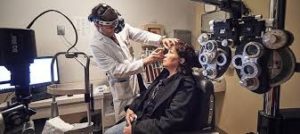
Ophthalmologists diagnose, treat and prevent disorders of the eyes and visual system.
Ophthalmology is a mixed medical and surgical specialty.
You can also contact us via the whatsapp link above
Conditions managed by ophthalmologist include:
- Corneal diseases (pathology of the cornea, the thin transparent layer that forms the front of the eyeball)
- Cataracts (where the lens of the eye loses transparency)
- Glaucoma (where the fluid pressure insides the eyes increases, causing eye problems)
- Squints (where there is a problem with the alignment of the eyes)
- Retinal problems (such as oedema within, bleeding, tears or detachment of the retina, the back inner surface of the eye that receives light)
- inflammation within the eye (Intraocular inflammation)
- Eye-related neurological problems
Ophthalmologists also manage patients with the following conditions:
- major and minor eye injuries
- infectious eye disease
- chronic diseases of the eye such as diabetic retinopathy (disease affecting the retina caused by diabetes) and age-related macular degeneration (deterioration of the macula, the central area of the retina)
Ophthalmic patients encompass the whole age range, from premature babies to the most senior members of the population. Patients are generally well and their conditions and are only rarely life-threatening. However, eye symptoms and disorders are very common and can cause considerable anxiety. Sympathetic advice and reassurance is often required in addition to diagnosis and treatment.
Ophthalmologists undertake eye surgery, which is usually performed with the aid of an operating microscope and may involve lasers.
Types of surgery include:
- cataract surgery – the most frequently performed operation, which is very successful and provides high patient satisfaction
- glaucoma surgery
- surgery for retinal disorders
- strabismus surgery (for squints)
- corneal transplantation
- oculoplastic surgery (plastic surgery around the eye)
- orbital surgery (relating to the eye socket)
Ophthalmic surgical procedures have benefited from huge improvements in technology in the last ten to fifteen years, resulting in earlier surgery with vast improvements in patient lifestyle. Further improvements have occurred in the delivery of eye surgery, with most operations dealt with as day cases.
A surge in exciting new technology and treatments in recent years have allowed ophthalmologists to manage patients with eye diseases in a much more effective way, and this trend is likely to continue as services expand.